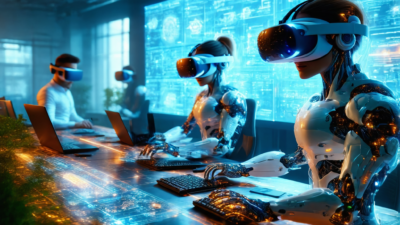The AI Revolution: How Artificial Intelligence is Reshaping Business
Imagine a world where machines not only perform repetitive tasks but also make decisions, predict outcomes, and innovate. That’s the reality we’re entering as artificial intelligence (AI) becomes an integral part of modern business operations. From streamlining workflows to enhancing customer experiences, AI is transforming industries at an unprecedented pace. But how exactly is this happening? Let’s delve into the ways AI is reshaping businesses in 2025.
Transforming Business Operations
One of the most significant impacts of AI is its ability to optimize business processes. By automating routine tasks, companies can save time and reduce errors. For instance, AI-powered tools can handle invoice processing, data entry, and even customer service inquiries with remarkable accuracy. This not only increases efficiency but also allows employees to focus on more strategic responsibilities.
Let’s look at some key areas where AI is making waves:
- Supply Chain Management: AI algorithms analyze vast amounts of data to predict demand, optimize inventory levels, and reduce waste. This leads to cost savings and improved customer satisfaction.
- Predictive Maintenance: In manufacturing, AI can monitor equipment performance in real-time, predicting failures before they occur. This minimizes downtime and extends the lifespan of machinery.
- Dynamic Pricing: E-commerce platforms use AI to adjust prices based on demand, competitor pricing, and other market factors, ensuring maximum profitability.
These applications are just the tip of the iceberg. As AI technology continues to evolve, its role in business operations will only expand.
Revolutionizing Customer Service
Customer service is another area where AI has made a significant impact. Chatbots, powered by natural language processing (NLP), are now capable of handling complex customer inquiries with ease. They can provide instant responses, resolve issues, and even offer personalized recommendations based on customer history.
But the benefits don’t stop there. AI-driven tools also enable companies to analyze customer feedback at scale. By identifying trends and sentiment from reviews and social media posts, businesses can make data-driven decisions to improve their products and services. For example:
- Personalization: AI algorithms study consumer behavior to deliver tailored marketing messages and product suggestions.
- 24/7 Support: Chatbots ensure that customers receive assistance round the clock, improving satisfaction and loyalty.
- Proactive Engagement: AI can anticipate customer needs before they arise, offering solutions before issues escalate.
These advancements are not just about convenience; they’re about building stronger relationships between businesses and their customers.
Driving Innovation and Decision-Making
Beyond operational efficiency, AI is driving innovation across industries. Companies are leveraging machine learning models to develop new products, improve existing ones, and explore untapped markets. For example:
- Healthcare: AI is being used to analyze medical data for better diagnoses, predict patient outcomes, and personalize treatment plans.
- Finance: Fraud detection systems powered by AI can identify suspicious transactions in real-time, protecting both businesses and customers.
- Retail: AI-driven analytics help retailers understand consumer preferences, optimize inventory, and create targeted marketing campaigns.
Moreover, AI is enhancing decision-making at the highest levels. By providing actionable insights derived from large datasets, it empowers executives to make informed choices that drive growth and profitability. This shift from intuition-based decisions to data-driven strategies is reshaping business landscapes worldwide.
The Future of Work
As AI becomes more integrated into business operations, it’s also influencing the future of work. While concerns about job displacement are valid, many experts argue that AI will augment human capabilities rather than replace them outright. For instance:
- New Roles: The rise of AI is creating demand for skilled professionals in areas like machine learning engineering, data science, and digital strategy.
- Upskilling: Companies are investing in training programs to help employees adapt to new technologies and take on more strategic roles.
- Creativity and Innovation: By handling routine tasks, AI allows humans to focus on creative problem-solving and innovation.
This shift towards a more collaborative human-AI workforce is not just about efficiency; it’s about unlocking new levels of creativity and productivity.
Conclusion: Embracing the AI-Driven Future
The impact of AI on business operations cannot be overstated. It’s not just a tool for optimization—it’s a catalyst for transformation. As we move further into the digital age, companies that embrace AI will gain a competitive edge, driving innovation and delivering exceptional value to their customers.
But this journey isn’t without challenges. Issues like data privacy, ethical considerations, and workforce adaptation need careful attention. However, with thoughtful implementation and continuous learning, businesses can navigate these waters successfully.
In the end, AI is not the future—it’s the present. And those who harness its power today will undoubtedly shape the business world of tomorrow.
Stay ahead of the curve by exploring how AI can transform your business operations. The possibilities are endless!





